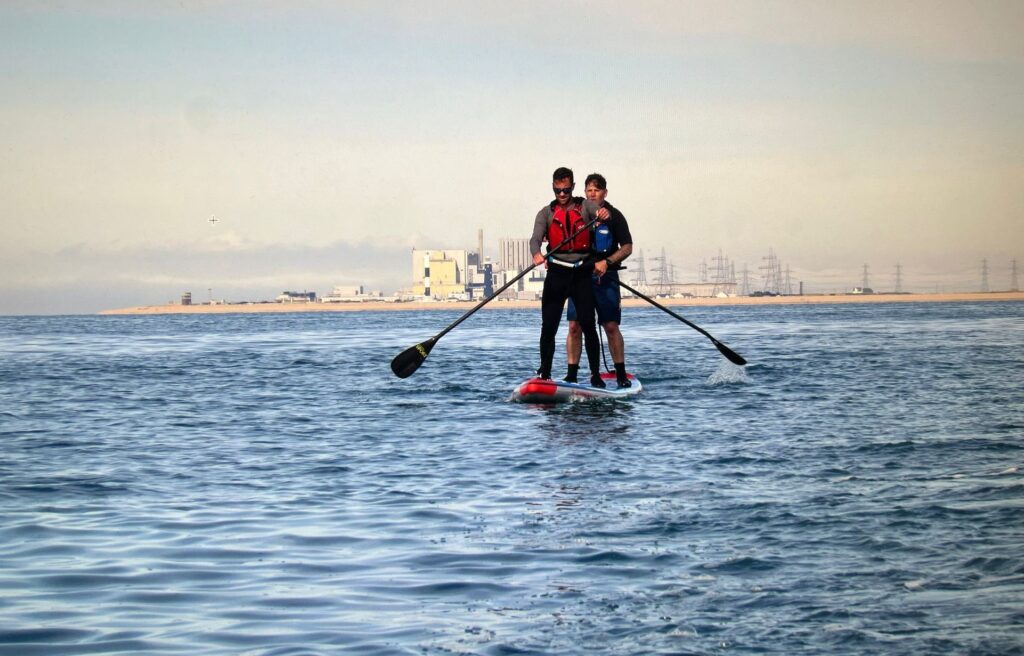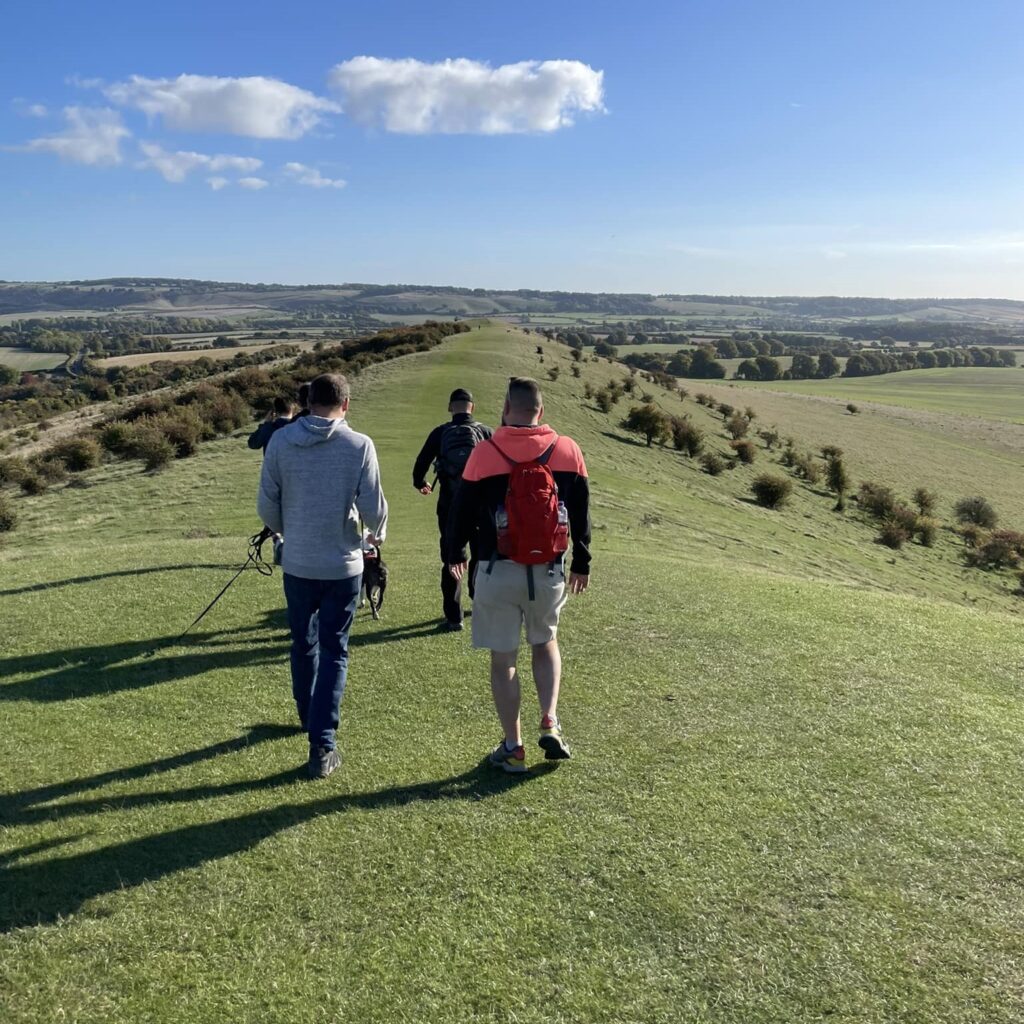On World Suicide Prevention Day, we shine a light not only on crisis—but on the possibilities for healing. Suicidal thoughts are more common than many believe, yet often those thoughts pass—or get pushed through—when we find an outlet that reconnects us to ourselves.
Meet Joe…

Joe Cartwright, a NHS paramedic from Dunstable, found himself grappling with PTSD and depression after a colleague suicide. He wasn’t dealing with a long-term mental health diagnosis—he was deeply overwhelmed and searching for release. And he found it in an unexpected place: paddleboarding.
Taking a lesson at Willen Lake in 2019, Joe discovered something profound. Here, Joe shares his story and insights on suicide – trust us, you are not alone!
For 30 minutes I didn’t have to think of anything instead of standing up on a paddleboard. That quiet immersion, balancing on water, was the reset that I needed— it required all my focus and energy, and I did not think about taking my life. I did not see the face of my colleague. It was just me, the board and the water!
I had received an experience voucher from my family, and I knew that, before I took my life, I needed to complete this. It was a way to say that I tried.
I have no hesitation that this was the action that not only saved my life, but it also gave my family back their husband, father and son.
If I didn’t get involved with paddleboarding I wouldn’t be here now, and it has opened up so much to me. In 2022 I wanted to do a challenge involving paddleboarding that would put suicide awareness not only on the map, but in the public eye. I even crossed the English Channel on a paddleboard—one of the hardest physical and mental feats I’ve ever done. The adventure gained a huge amount of press and finally, people started talking about suicide and normalising a subject that has been hidden for decades. Since that crossing I paddled the length of the non-tidal River Thames nonstop in 44hrs, this achieved my first World Record. In 2024, myself and my tandem partner crossed the Channel again, this time as the first ever tandem paddleboarders to attempt it. It’s fair to say, I’m done with the Channel, it’s a beast that tests every part of mental ability, and physical strength.

How Common Are Suicidal Thoughts in the UK?
In England, about 1 in 6 adults (16.7%) have thought about suicide at some point—and among 16–24 year olds, nearly 1 in 3 (31.5%). In any given year, roughly 1 in 20 adults go through this—even if most never speak about it. It feels like a scary statistic but the important thing to take from this is that these thoughts are widespread, happening to people from all walks of life.
These thoughts don’t always signal a mental illness—they can emerge in moments of overwhelm when our usual coping strategies are exhausted.
When Overwhelm Clouds Reality
At their worst, suicidal thoughts can feel like a mental ledger:
Pros of ending it: relief, no longer feeling like a burden, ending the pain.
Cons of staying: guilt, shame, perceived weakness, the fear of burdening others.
When your brain is worn out, the “pros” can weigh more heavily—even if that doesn’t reflect the whole truth.
Many of us stay silent for a variety of reasons, trust me as a paramedic that talks to people when they are experience this overwhelm overload I have heard them all.
Embarrassment— “What will people think when they find out I have debt/have lost my job/got caught in an act?”
Not wanting to burden others—“They’re dealing with enough, I can’t add my worries and pressures to them.”
Cultural or religious guilt—“It’s wrong to think this.”
Fear of losing control—“Speaking means admitting I’m slipping.”
Outlets That Help Reset the Mind
These moments are not only overwhelming, but they can also feel terrifying, especially when the only dialogue you have is in your own head.
Just because you are thinking these thoughts, it does not mean that something is wrong with you or that you are broken. Take a look at the stats above – these thoughts are more common than you think.
What we need to do as a society is to acknowledge these thoughts for what they are – a signal that we are taking on too much and need to reset.
For me, it was paddleboarding – I needed that activity that would take my mind away from EVERYTHING, an opportunity to be in the moment only. Here are some other ways to help you hit that reset button.
- Talking—even if it’s uncomfortable, sharing can defuse the weight.
- Walking—being beside someone, not face-to-face, can ease the pressure.
- Engaging in an activity—learning a skill, creating, doing something with your hands.
- Physical movement—sport, exercise, even stretching can give your mind space to breathe.
These actions interrupt the overwhelm and give your brain a different input. It may be that it helps immediately, it may require a bit more of a process. The important thing is to give yourself that opportunity, you are worth it!

What You Can Do—Right Now
If suicidal thoughts are overwhelming you, here are 3 quick things you can try right now:
- Ground yourself—focus on senses, surroundings, movement, breathing.
- Reach out—call a friend, text a helpline, find any connection.
- Try something small—go for a walk, listen to music, do something that shifts your focus.
If you’re worried about someone else:
- Ask, “How are you, really?” Don’t be too afraid to ask if they are having suicidal thoughts – this is a thought that many people have as a reaction to overwhelm.
- Listen—don’t talk over them. Nobody expects you to have all the answers.
- Suggest trying something simple together.
- Keep checking in—not just once, but again later.
Final Thought: Reset, Don’t Surrender
A big thank you to Joe for sharing his story and insights.
Suicidal thoughts aren’t signs of failure. They’re signals that something’s overwhelmed your usual defences. Just as Joe found release on his paddleboard, you may find calm in movement, creation, nature—something that brings you out of your head and back to being alive.
________________________________________
Need Support?
Samaritans (UK): Call 116 123, anytime, free.
Text “SHOUT” to 85258 for confidential text support.
Call 999 if someone is in immediate danger.
Or join one of our Walk & Talk groups—spaces to connect, share, and reset.
The OLLIE Foundation – Suicide Prevention and Wellbeing Charity provides free suicide prevention, intervention and post-vention training.

